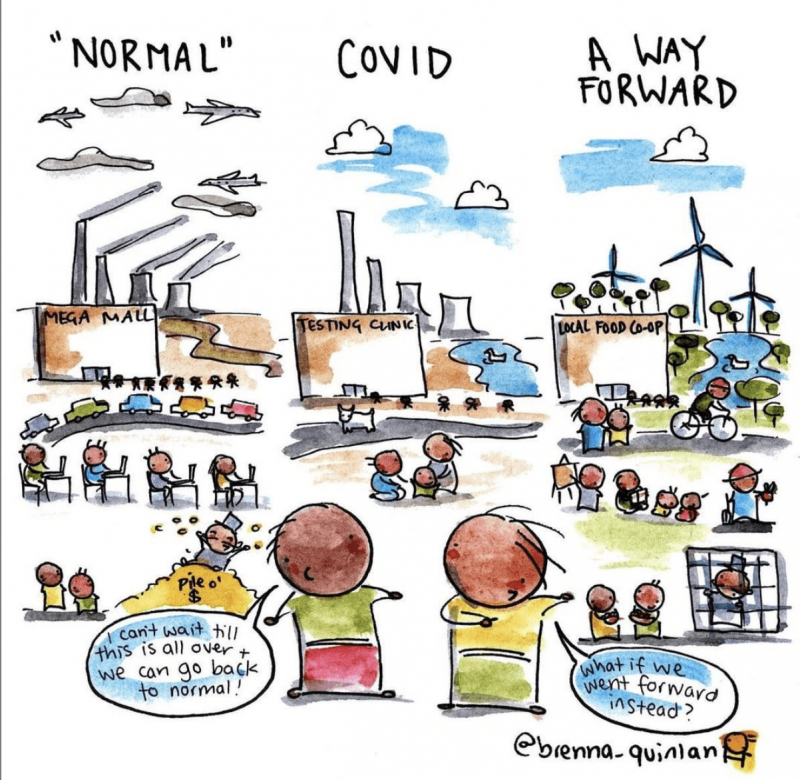This Too Shall Pass
I am The Sustainabilist

May 9, 2020, 10:41 am
By Mohamed Elimam
It has been 8 weeks since the World Health Organization declared COVID-19 as a global pandemic. The emotional roller-coaster is becoming stronger, but has gotten in a recognizable pattern. On one hand, the new peak frequency of news of companies undergoing mass lay-off exercises is nerve wrecking. The longingness to our old ways of socializing and exploring that world is accumulating. On the other hand, periods of stress have brought out some of the most wonderful portraits of compassion. Some are now also able to see how blinded, and in some cases even abusive, our old ways are.
To be honest, I write this piece with the tabs of my browser split between hopeful and desperate, and so are my thoughts. However, one saying that has constantly helped me in staying level-headed is “This too shall pass“, by Rumi. But at what cost? How is the world going to look like post-corona? We keep chanting slogans of solitude, but how far are we really willing to go for each other? Are we capturing the lessons? Are we taking a moment to understand what they mean? How can we prepare? Those and many more questions have become the natural occupier of board-room, family-room, and zoom-room discussions.
For a second, let us set aside the obvious realities of unemployability. According to Linkedin Workforce Report for May 2020, and in the US alone, hiring saw an unprecedented drop in April, down 24% M/M and 30% Y/Y. The least impacted industries are: hardware & networking (-8.5% Y/Y), public safety (-10.1% Y/Y), education (-15.6% Y/Y). The industries that are struggling the most are: travel & leisure (-71.1% Y/Y), real estate (-49.2% Y/Y) and construction (-45.8% Y/Y).
And it does not stop there. I will highlight few subtle, yet seismic changes that have already started as the world reforms. Here are five trends already set in motion:
- Cashless payments: as the world continues to fight the spread of the coronavirus, cashless, and even contactless payments, have taken center stage. As public and individual safety takes priority, countries, cities, governments, and companies that have forever held on to cash payments, to cater for a specific segment of customers, have now “ripped-off” the bandit, and just gone cashless. Leaving the customer no choice, but to adapt.
- Remote working: in many cases, remote working became the life-line for business continuity. But as we go about work as normal as we can, corporates start realizing the huge saving opportunity in overhead caused by physical offices. When productivity can be retained, and specially in times of financial tightness, there is no going back.
- Freelance and gigs: as businesses continue to struggle amid a global recession, ushered by the global lockdown, typical full-time employment, with social benefits have, and will continue to, become rare.
- Continued social distancing: with the timeline of vaccines stretching to anywhere between a year and 18-months, and with the very much valid caution built up in people, social distancing practices will continue. Restaurants will need more space for less tables, and will be serving far less dine-in customer. The same with hotels having to cap recreational facilities. Rendering many of the hospitality sector workers redundant. With less attendees, and hence less brands exposure, many of events will have to go digital. Once again, leaving event hosting venues, and event management companies with far less income. However, there might be a very small offset with locals redirecting their typical tourism spending locally.
- More learning becoming online: as schools around the world resorted to either early termination of the academic year, or moving to online learning modes, both parents and teachers are in the deep end of the struggle. But that is just one side of the picture. Schools and universities are now realizing the sizable savings in shutting down large school facilities. Universities are realizing the redundancy of a century-old ways of physical attendance. Massive Open Online Course platforms are having their value proposition endorsed and revalidated.
Now, these transformations are already underway. Some debate that, eventually, they are for the best. Some debate that they are even inevitable. I do not think it is that straightforward. However, for the purpose of this piece and as a hopeful call for action to prepare for the era post-coronavirus, I am listing five things to keep in consideration:
- One of my biggest worries, and specially with continuous rapid technological progress, is that gap between those who are “rich” and “poor” increases. Usually, named “Digital Divide”. Let us simplify it and take an example. If I have access to a computing device and decent internet connection, I am likely at least in the “ok” economic zone. Hence, it is on me to fight this pandemic, perhaps by upskilling myself. However, if I am struggling gaining ends-meet, I am less likely to have access to a computing device and decent internet connection. As it is, I will be left to get “poorer”. I believe that those who deem technological advances as our way forward, are ought to also be responsible that the gap does not get bigger. And it is doable.
- Whether it is individuals, governments, or organizations, collectively we out to look out for the physical space attendants. Change is happening, and some loses are inevitable, but can definitely be minimized. Just as examples: several restaurants across the world have now up- and reskilled their workers to either deliver or prepare food. Careem has laid-off hundreds of its employees, while their own HR teams have gotten on the phone and started calling other companies looking for vacancies for their laid-off. The examples are many, and we will need to see more.
- As the needle shifts more and more towards cashless, we ought to keep in an eye on those typically surviving on tips. Digital platforms develop need to ensure that tipping remains an option within the process. While individuals ought to demand for the option.
- As freelance and gig economy bolsters, their workers are blinded to dark side of the opportunities. Freelance and gig workers are typically unrecognized as full-time employees, stripping them of the typical social benefits, such as medical insurance and sick leaves. This is now more critical than ever. As an example, those gig type entertainers, and those Uber drivers, are all now without income. Additionally, they are without end of service benefits and medical insurance, leaving them extremely vulnerable. Therefore, international agencies across the world are, now more than ever, calling for more inclusive labor schemes.
- Lastly, and as I write this piece, I realized the struggle some of those far more experienced, yet less tech-savvy, teachers are facing with more of the educational system going digital. I fear that, while the educational system does need overhaul reform, we lose high quality experienced teachers and professors.
Change is the only constant in our lives. This time around, change is amped-up with a global pandemic forcing the world to slow down, and for some, self-reflect. Every single one of the trends mentioned above is a double-edged sword, all within our control. The entire world is responsible for taking thorough critical look at the choices shaping our tomorrows, and, making the choices that will leave us collectively, better.









